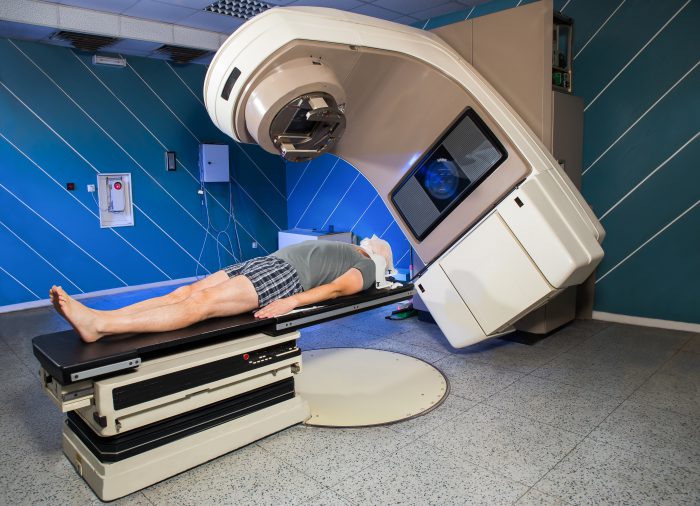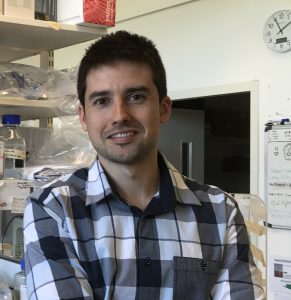

We're spending another $2.8m on prostate cancer research.
Following our Grant Call, we're investing over $2.8 million into new research projects. We'd like to introduce you to the people these awards went to, and what they hope to achieve for men and families affected by prostate cancer.
STAMPEDE is one of the largest ongoing clinical trials on advanced prostate cancer in the world, and has already led to changes in the way prostate cancer is treated. This latest research will look at DNA in tumors from men, who took part in STAMPEDE, and whose prostate cancer spread.
The team will see whether differences in DNA can be used to divide the men into groups which are more or less likely to respond to different treatments. By combining the results from this project with other research projects from STAMPEDE, they have a unique opportunity to develop an affordable test which could soon be used in the clinic to help doctors choose the right treatment for patients based on the specific profile of their individual cancer.
“We have some very promising results on copy number profiling of a pilot set of 50 STAMPEDE tumors. PCR funding will enable us to expand our analyses to tumors from 675 men who received hormone therapy alone or with Abiraterone or Docetaxel and test the hypothesis that based on a cancer’s copy number profile, a decision on whether to use Abiraterone or docetaxel or no additional treatment can be made. This will be invaluable information for physicians and patients and allow us to implement precision medicine for these important treatments.” – Gerhardt Attard
“It is fascinating to be part of the process of selecting projects for funding but it is a hard job to draw distinctions between proposals that are all very worthy in their own ways.
Dr David Matheson
PCR Patient Panel Member

Professor Bart Cornelissen received a PCR Pilot Award.
PSMA is a protein which exists on the surface of most prostate cancer cells, but is not on normal cells. PSMA can be used to tell cancer and normal cells apart, and even to guide radiotherapy directly to the cancer cells. While this new treatment is becoming more available and has potential to help many men, it doesn’t work for all patients right now.
This project aims to make PSMA treatment work better and work in more men by combining it with other drugs. For example, because radiotherapy works by damaging the DNA inside a cancer cell, adding another drug which damages DNA in a different may might make both treatments work even better than either of them used on their own. To start, Professor Cornelissen will combine the radiotherapy treatment 177LU-PSMA with approximately 1,000 drugs.
“Late-stage prostate cancer remains challenging to treat, especially cancer that has spread to other organs, and is resistant to testosterone removal therapy. Using this PCR award, we will investigate novel therapy combinations for prostate cancer, to increase tumor kill, while reducing unwanted side-effects. This award will allow us to perform these studies on an unprecedented scale, an exciting prospect. It increases the likelihood we will find a potent combination of therapies, improving the prospects for long-term cures in this group of cancer patients.” – Bart Cornelissen
“We are delighted to be scaling up the number of researchers we are supporting by 175%. Only by finding and funding exceptional scientists with novel ideas can we expect to make real differences to the lives of patients. Our single long term aim is for all people with prostate cancer to receive personalized effective care that enables them to live full and healthy lives.
Oliver Kemp
CEO, PCR

Dr Jorge de la Rosa received a PCR Pilot Award.
Inside our cells there are “on switches” which tell cells to grow and make more copies of themselves, and “off switches” which stop cells growing and dividing. These switches trigger chain reactions and exist as part of a complicated network, like the wires inside a computer or the switches in a fuse box. When a normal cell turns into a cancer cell, it can be hard to work out which switch has tripped.
PTEN is a ‘tumor suppressor’ or off switch which doesn’t work properly in almost half of advanced prostate cancers. This project aims to understand what other changes happen at the same time that PTEN stops working, and how these changes inside the cell work together to drive the growth and spread of prostate cancer.
“In this research project we will develop new genetic tools that will mimic the development of human prostate cancer. We aim to identify and understand the faulty genes that cause human prostate tumors to spread, and eventually find the “vulnerabilities” of these disseminated cancers. I am very grateful to PCR and I feel very excited about this work, which I hope will bring new prognostic and therapeutic opportunities for people with prostate cancer.” – Jorge de la Rosa
We want to say A MASSIVE THANK YOU to our Racers for Science, our marathon runners, mountain climbers, generous givers, and all of our #TeamPCR superstars who’ve made all this possible.
Patient Voice
A panel of prostate cancer patients and their family members helped us to select these projects. If you have been affected by prostate cancer and would like to use your experiences to help other patients, email [email protected] for more information.
Apply for Funding
If you are a researcher and would like to be kept informed of future grant calls, please email [email protected] with ‘Grant Call Opt-in’ in the subject line.